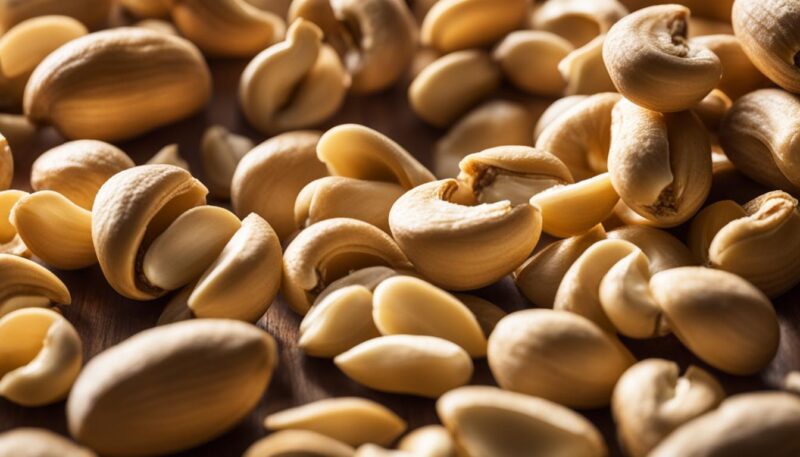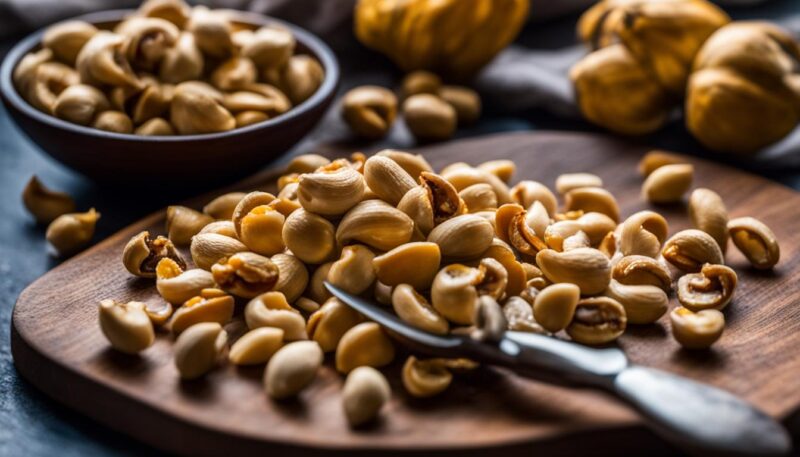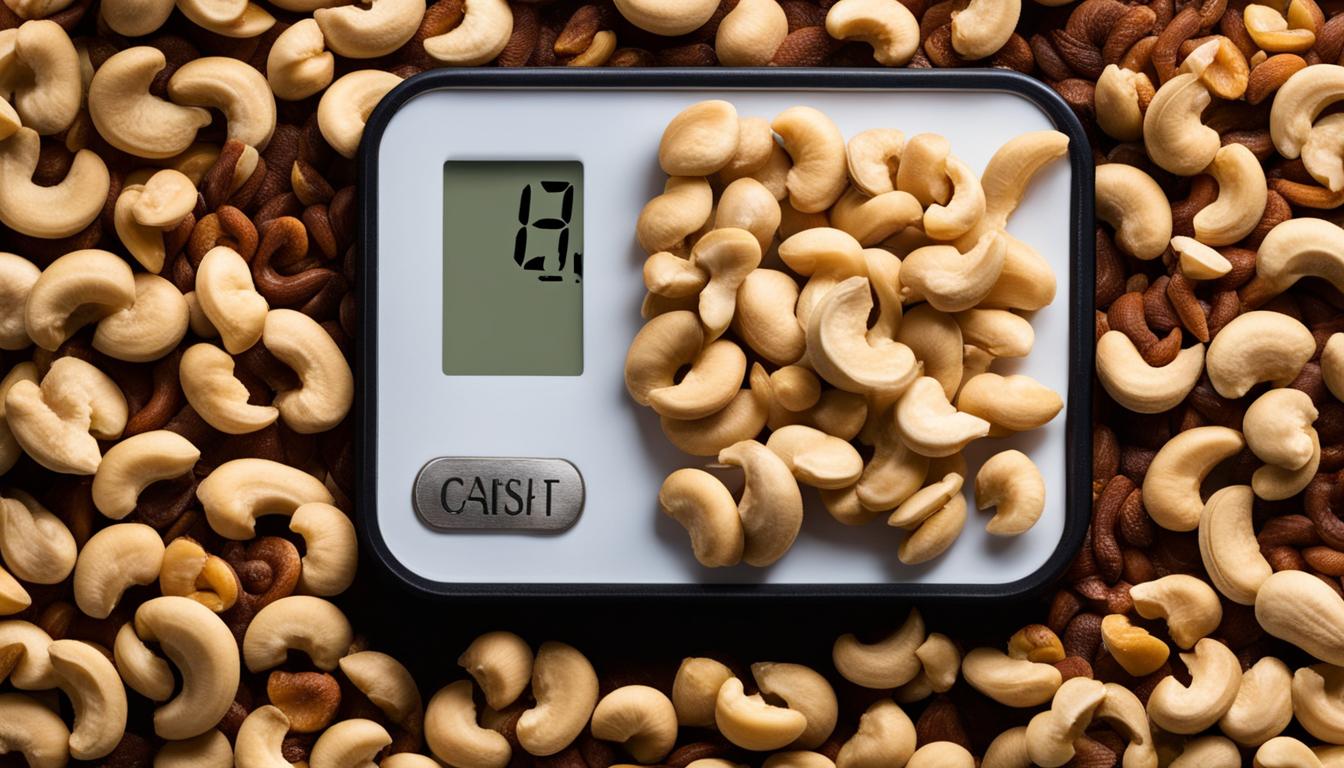Cashews are a popular nut known for their delicious taste and crunchy texture. But are they actually good for you? In this article, we will explore the nutrition benefits and downsides of cashews, helping you make an informed decision about incorporating them into your diet.
When it comes to nutrition, cashews offer a range of benefits. They are rich in protein, heart-healthy fats, and beneficial plant compounds. Additionally, they are low in sugar and a good source of essential minerals like copper, magnesium, and manganese. These nutrients play a vital role in supporting various bodily functions, from energy production to immune system health.
However, it’s essential to be aware of the downsides of cashews as well. Raw cashews contain a toxic substance called urushiol and should be cooked before consumption to ensure safety. Additionally, cashews are high in calories and should be enjoyed in moderation to avoid weight gain.
Key Takeaways:
- Cashews are a nutrient-rich nut, high in protein, heart-healthy fats, and beneficial plant compounds.
- They are low in sugar and a good source of essential minerals like copper, magnesium, and manganese.
- Raw cashews contain a toxic substance called urushiol and should be cooked before consumption.
- Cashews are high in calories and should be consumed in moderation.
- Incorporating cashews into a balanced diet can provide various health benefits.
Nutritional Value of Cashews
When it comes to nutritional value, cashews are in a league of their own. Packed with essential nutrients, these delicious nuts provide a wide range of health benefits. Here’s a closer look at the key nutrients found in cashews:
- Protein: Cashews are a good source of protein, making them an excellent option for those looking to boost their protein intake.
- Healthy Fats: Cashews are rich in heart-healthy fats, including monounsaturated and polyunsaturated fats, which can help reduce the risk of heart disease.
- Fiber: These nuts contain a good amount of dietary fiber, which is essential for a healthy digestive system and can help promote feelings of fullness.
- Vitamins: Cashews provide important vitamins such as thiamine, vitamin K, and vitamin B6, which play a crucial role in energy production, brain development, and immune function.
- Minerals: Cashews are a great source of minerals like copper, magnesium, and manganese, which are involved in various biochemical processes in the body.
By incorporating cashews into your diet, you can enjoy the nutritional benefits they offer and support your overall well-being.
Table: Nutritional Content of Cashews (Per 1-ounce serving)
| Nutrient | Amount |
|---|---|
| Calories | 157 |
| Protein | 5 grams |
| Fat | 12 grams |
| Carbohydrates | 9 grams |
| Fiber | 1 gram |
| Copper | 0.6 milligrams |
| Magnesium | 82 milligrams |
| Manganese | 0.5 milligrams |
It’s important to note that these values may vary slightly depending on the brand and preparation method of the cashews.
With their impressive nutritional profile, cashews are a valuable addition to any healthy diet. Whether enjoyed as a snack or incorporated into your favorite dishes, these nutritious nuts can contribute to your overall well-being.
Health Benefits of Cashews
Cashews offer numerous health benefits that make them a valuable addition to a balanced diet. Here are some of the key advantages:
1. Weight Management
Adding cashews to your diet can aid in weight loss and management. These nuts are high in protein and fiber, which can help you feel fuller for longer and reduce cravings. By promoting satiety, cashews can support a healthy calorie intake and potentially contribute to weight loss goals.
2. Heart Health
Cashews have been associated with improved heart health. They contain heart-healthy fats, such as monounsaturated and polyunsaturated fats, which can help lower LDL (bad) cholesterol levels. Additionally, the minerals found in cashews, like copper and magnesium, are beneficial for heart function and can help regulate blood pressure.
3. Immune System Support
Cashews may also contribute to a healthy immune system. They are a good source of several essential nutrients, such as zinc and selenium, which play crucial roles in immune function. These nutrients help support the production and activity of immune cells, which help defend against infections and diseases.
4. Blood Sugar Control
Cashews have a low glycemic index, meaning they have a minimal impact on blood sugar levels. This makes them a suitable food choice for individuals with diabetes or those looking to maintain stable blood sugar levels. The combination of protein, healthy fats, and fiber in cashews helps slow down the absorption of sugars into the bloodstream.
Incorporating cashews into your diet can bring about these health benefits and contribute to overall well-being. However, it is essential to exercise portion control, as cashews are relatively high in calories. Enjoy them as part of a varied and balanced diet to maximize their nutritional advantages.

Downsides of Cashews
While cashews offer numerous health benefits, it is important to be aware of the potential downsides associated with their consumption. Here are some of the key considerations:
1. Oxalate Content
Cashews contain a moderate amount of oxalates, which are naturally occurring compounds found in certain foods. In excessive amounts, oxalates can contribute to the formation of kidney stones and may be harmful to individuals with a history of kidney problems. However, it’s important to note that most people can tolerate normal levels of oxalates without any issues. If you are prone to kidney stones or have a pre-existing condition, it is advisable to consult with a healthcare professional before incorporating cashews into your diet.
2. Toxic Substance in Raw Cashews
Raw cashews contain a toxic substance called urushiol, which is also found in poison ivy and poison oak. This substance can cause skin irritation and allergic reactions when consumed in its raw form. Therefore, it is crucial to ensure that cashews are properly cooked or processed before consumption to eliminate the presence of urushiol.
3. Calorie Dense
Cashews are high in calories and should be consumed in moderation, especially for individuals who are watching their weight or trying to maintain a calorie-controlled diet. Overconsumption of cashews can contribute to weight gain and may disrupt overall calorie balance. It’s important to be mindful of portion sizes and consider the calorie content of cashews when incorporating them into your diet.
Despite these downsides, cashews can still be enjoyed as part of a healthy and balanced diet. By practicing moderation and being aware of these considerations, you can safely reap the nutritional benefits of cashews while minimizing any potential drawbacks.
| Downside | Impact |
|---|---|
| Oxalate Content | May contribute to kidney stone formation |
| Presence of Urushiol in Raw Cashews | Can cause skin irritation and allergic reactions |
| Calorie Dense | Can contribute to weight gain if consumed in excess |
Incorporating Cashews Into Your Diet
Cashews are a versatile and nutritious addition to any diet. They can be enjoyed in a variety of ways, making them a convenient and delicious snack option. Here are some ideas on how to incorporate cashews into your daily meals and snacks:
1. Snack on roasted cashews
Roasted cashews make a satisfying and nutritious snack. Enjoy a handful of cashews between meals to curb hunger pangs and provide your body with essential nutrients. You can also mix roasted cashews with other nuts and dried fruits for a flavorful and filling trail mix.
2. Add cashews to salads
Cashews add a delightful crunch and a creamy texture to salads. Sprinkle a handful of chopped cashews over your favorite salad combination for an extra dose of protein, healthy fats, and fiber. You can also experiment with making a homemade cashew dressing by blending cashews with olive oil, lemon juice, and herbs.
3. Use cashews in cooking
Cashews can be a versatile ingredient in various dishes. Add them to stir-fries for a nutty flavor and added protein. You can also use cashews as a dairy-free alternative in creamy sauces, such as cashew-based Alfredo sauce or vegan cheese sauce. Additionally, try incorporating cashews into your baking recipes for a nutritious twist.
Remember, when using cashews in cooking, it is best to choose roasted or steamed cashews rather than truly raw cashews. This ensures that any potential toxins are eliminated through the cooking process, making them safe to consume.
By incorporating cashews into your diet in these creative ways, you can enjoy the nutritional benefits they offer while adding variety to your meals and snacks. Whether you snack on roasted cashews, add them to salads, or use them in cooking, cashews can enhance the flavor and nutritional value of your dishes.
| Ways to Incorporate Cashews Into Your Diet | Examples |
|---|---|
| Snacking | Enjoy a handful of roasted cashews as a nutritious snack between meals |
| Salads | Sprinkle chopped cashews over your favorite salad combination for added crunch and creaminess |
| Cooking | Add cashews to stir-fries, use them in creamy sauces, or incorporate them into baking recipes |

Conclusion
In conclusion, cashews are a nutritious and beneficial addition to a balanced diet. With their rich nutritional profile, including protein, heart-healthy fats, and important minerals, cashews offer several health benefits. Incorporating cashews into meals and snacks is easy, and they can be enjoyed in various ways.
However, it is important to consume cashews in moderation due to their high calorie content. While cashews are packed with nutrients, excessive consumption can contribute to weight gain. Additionally, it is crucial to avoid raw cashews as they contain urushiol, a toxic substance. Opt for roasted or steamed cashews to ensure safety.
When included as part of a healthy eating pattern, cashews can positively impact overall health and well-being. Their potential to aid in weight loss, improve heart health, support the immune system, and provide antioxidant benefits makes them a valuable addition to any diet. So go ahead, enjoy the delicious taste and health benefits of cashews!
FAQ
Are raw cashews safe to eat?
No, raw cashews are not safe to eat as they contain a toxic substance called urushiol. They should be cooked before consumption to remove this toxin.
Can cashews help with weight loss?
Yes, cashews can aid in weight loss due to their high protein and fiber content, which helps reduce hunger and promote satiety.
Are cashews high in calories?
Yes, cashews are high in calories and should be consumed in moderation to avoid weight gain.
Is it safe for individuals with nut allergies to consume cashews?
No, individuals with nut allergies should avoid cashews as they can cause severe allergic reactions.
How can cashews be incorporated into a diet?
Cashews can be eaten as a snack, added to salads, used as a topping for yogurt or oatmeal, or blended into nut butter or milk. They can also be included in various dishes such as stir-fries, soups, and desserts.

